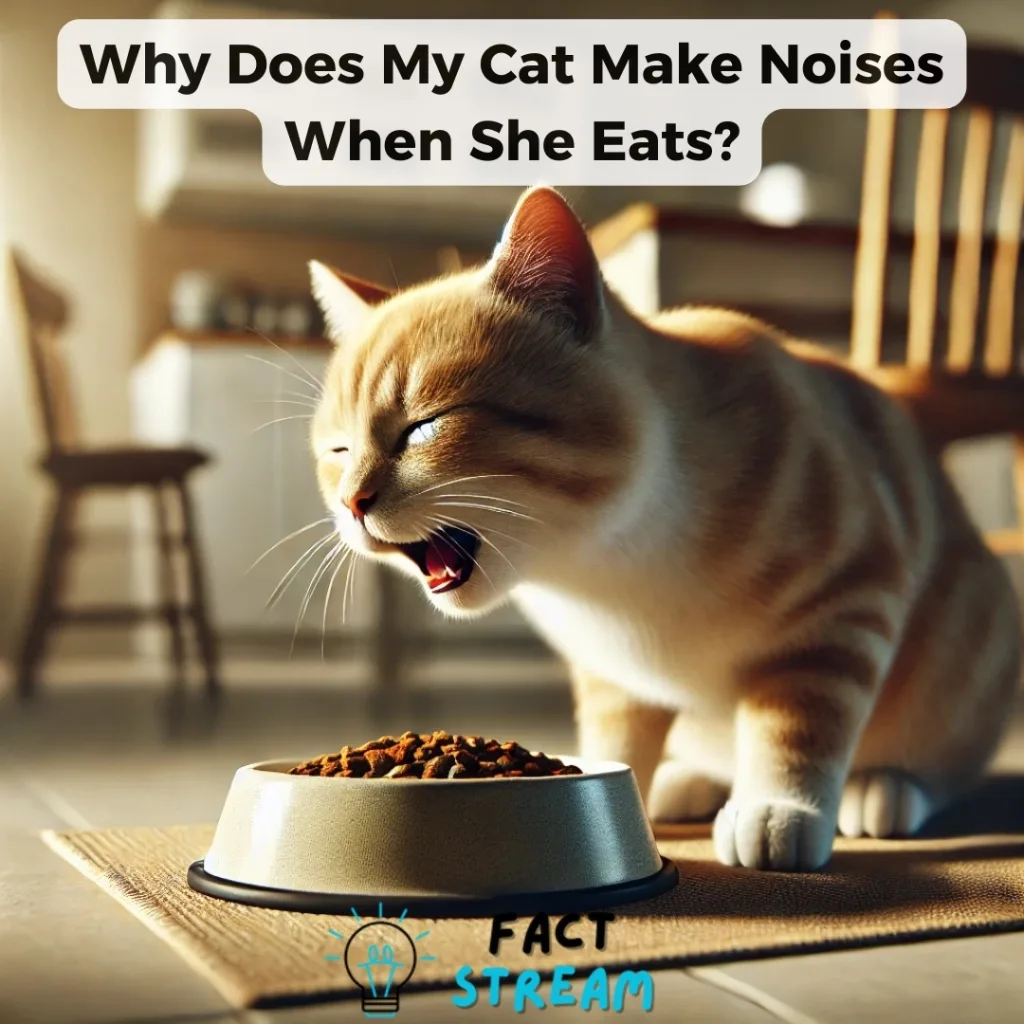Why Does My Cat Make Noises When She Eats?
Have you ever been enjoying a quiet meal when suddenly, your cat starts making a racket while eating their dinner? Maybe they’re purring loudly, or making little chirping noises. Perhaps they even growl or hiss! It can be confusing to figure out what these noises mean. In this blog post, we’ll explore the different noises cats make when they eat and what they could be trying to communicate.
Like humans, cats have a wide range of vocalizations, sometimes up to 21 or more! Why does my cat make noises when she eats? Could it be a happy sound or a sign that something’s wrong? Let’s break down the different sounds and what they might mean.
Happy Eating Noises
Sometimes, cats make noises while eating just because they’re happy and enjoying their meal. Here are a few sounds that usually mean your cat is content:
- Purring: This is the most common sound associated with happy cats. If your cat is purring while they eat, they’re probably just really enjoying their food.
- Trilling: A trill is a sweet, high-pitched sound that cats make when they’re happy and content. It’s like a combination of a purr and a meow! They might trill to greet you or thank you for the yummy food.
The Hunter’s Instinct
Even though your house cat might not need to hunt for their food, their instincts are still there! Sometimes, you might hear your cat make noises that sound like they’re stalking prey, even while they’re eating from their bowl. This is totally normal and just a sign of their natural instincts kicking in! Here are some sounds associated with hunting:
- Chirping: This is a short, bird-like sound that cats make when they see something they want to catch. They might chirp at a bird outside or even a toy mouse. Sometimes, cats chirp while they’re eating, especially if they’re excited about the food!
- Chattering or Twittering: This is a funny clicking sound cats make with their teeth, often when they’re watching birds or squirrels outside. It’s thought to be a way of expressing their frustration at not being able to catch the prey.
Sounds of Trouble
While some eating noises are cute and harmless, others can be a sign that something’s not quite right. If your cat makes any of the following noises while eating, it’s important to pay attention and maybe even contact your vet:
- Growling: A growl is a low, rumbling sound that cats make when they feel threatened. If your cat growls while eating, it could be a sign that they’re feeling protective of their food or that they’re in pain.
- Hissing: This is another warning sound that cats make when they’re feeling scared or threatened. A hissing cat will often flatten their ears, puff up their fur, and arch their back. Like growling, hissing while eating could mean your cat is feeling possessive of their food or that they’re experiencing pain.
- Yowling: Yowling is a long, drawn-out meow that sounds like your cat is in distress. Cats might yowl for a variety of reasons, including pain, illness, anxiety, or even cognitive decline (similar to dementia in humans). If your cat yowls after eating, it’s important to figure out what’s causing the distress and seek veterinary attention if needed.
Possible Reasons for Distress
- Dental problems: Cats with dental issues like tooth decay, gum disease, or abscesses might experience pain while eating. This can cause them to growl, hiss, or even yowl. Regular dental checkups are crucial for cats, just like for humans!
- Nausea: Just like us, cats can feel nauseous after eating, especially if they eat too much or have a sensitive stomach. They might make noises like grinding their teeth or even vomit.
- Digestive Issues: Some cats have food allergies or sensitivities that can cause digestive upset. They might experience gas, bloating, diarrhea, or vomiting, and make noises to express their discomfort.
- Kidney Disease: Cats with chronic kidney disease (CKD) often experience nausea and might grind their teeth while eating. It’s important to monitor older cats for any changes in eating habits or vocalizations and seek veterinary care if needed.
Paying Attention to Changes
The most important thing to remember is that any sudden or significant change in your cat’s eating noises, along with changes in how much they eat, their energy levels, or how much they sleep, can be a warning sign. If you notice any of these changes, it’s always a good idea to check in with your vet. They can help determine if there’s an underlying medical issue that needs to be addressed.
Cats are fascinating creatures, and while we may not always understand their language, by paying close attention to their vocalizations and behavior, we can become better attuned to their needs and build a stronger bond with our feline companions.


